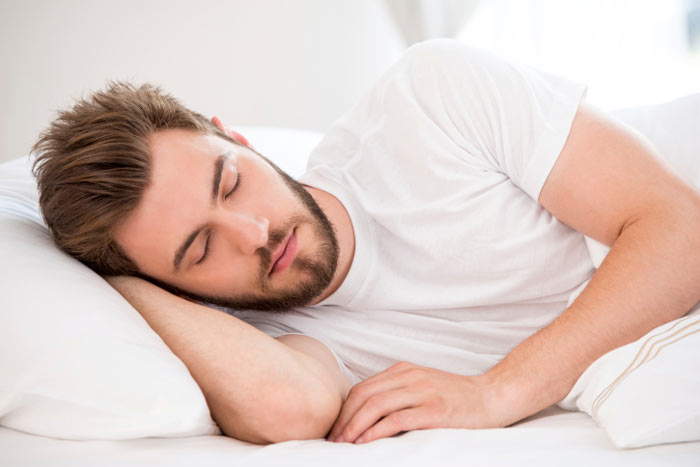A good night’s sleep will help you build your bones
Lissa Coffey, a lifestyle, sleep, and relationship expert, shares tips for getting the sleep our bones need to stay healthy.
When we are tired, we are often told that we need to “rest our weary bones.” According to an intriguing bone density study, we should take this phrase literally! Sleep, according to Medical College of Wisconsin research, actually helps build your bones.

Scientists discovered that a lack of sleep disrupted new bone formation in lab rats in their study. Furthermore, the rats’ existing bones continued to lose density as expected. They discovered a decrease in fat and an increase in platelet-generating cells in bone marrow. All of this means that the rats in the study had significantly reduced flexibility and more fragile bones.
Another study from China looked at the relationship between sleep deprivation and lower bone density in middle-aged and older women and discovered a link.
This teaches us that in order to take care of your bones, your body must be able to go through a bone remodeling cycle. The process is also important for keeping the body flexible in order to avoid fractures.
We recover quickly from normal bone wear with our normal activities. When sleep deprivation has a negative impact on bone remodeling, bone density may decrease. As a result, we may become less flexible, more prone to fractures, and more prone to osteoporosis. There’s no denying that sleep is essential for bone health. Continue reading for bone health tips that can help you improve your bone density.
How Does Aging Affect Sleep?
But here’s the catch: osteoporosis is linked to aging. And getting a good night’s sleep becomes more difficult as we get older. One reason for this is that melatonin, also known as the “sleep hormone” due to its influence on sleep, declines with age.
Melatonin is produced by the body in response to the amount of light we are exposed to. Getting some sunlight during the day helps the body produce melatonin at night. The combination of age-related lower melatonin levels and sleep loss puts us on a downward spiral that accelerates bone loss.
We can’t stop aging, and we can’t change some of the other risk factors for osteoporosis, like:
- Women are more likely than men to develop osteoporosis, especially after menopause. Building bone density after menopause can be difficult for many older women, and it can result in long-term bone loss.
- White and Asian people are more likely to develop osteoporosis than other ethnic groups.
- Tall people (5 feet 7 inches or taller) and those weighing less than 125 pounds are at a higher risk.
- Those with a family history of osteoporosis or a hip fracture are at a higher risk.
- Those over 50 who have had previous fractures from minor injuries are more likely to be diagnosed with osteoporosis.
Fortunately, there are many things you can do to help prevent osteoporosis, such as staying active and mobile. See our five bone health tips to ensure you get enough sleep to keep your bones healthy for years to come:
Increase Melatonin
Melatonin, in addition to aiding sleep, acts as an antioxidant, reducing bone damage caused by activity and free radicals in the environment. It can aid in the healing of fractures and surgeries. While melatonin supplements can cause dependence, there are many other natural options for increasing melatonin production.
Every day, get some sunlight, and sleep in a dark or dimly lit room. Sunflower seeds, alfalfa sprouts, almonds, eggs, goji berries, and tart cherries are a few examples of melatonin-rich foods to include in your diet to help you get started on building back bone density.
Get Daily Exercise
Even 10 minutes of aerobic exercise per day can help you sleep better. Make sure to exercise during the day and not too close to bedtime. After exercise, you need time to recover and relax. People frequently wonder which types of exercise help to build strong bones. Weight-bearing conditioning exercises have been shown to improve bone health.
Walking with weighted vests has become a popular and safe way to exercise without overdoing it. Yoga improves flexibility and balance, lowering the risk of falls and fractures. It’s also critical to keep a healthy body weight. Obesity is linked to sleep apnea, which disrupts sleep.
What Minerals Aid in Bone Formation?
Magnesium has been hailed as a sleep aid, and it is also beneficial for bone building. Calcium, iron, and zinc have also been shown to help prevent osteoporosis. Vitamin D aids the body’s absorption of calcium, making it essential in the fight against osteoporosis. Sunlight, saltwater fish, liver, and vitamin D-fortified foods are all sources of vitamin D.
Avoid Alcohol and Tobacco
We all know that drinking alcohol at night disrupts sleep, but did you know that it is also linked to lower bone density? Tobacco is also a factor. As much as possible, avoid these substances.
Get Screened
This may be the most important of all the health tips for strong bones that we’ve discussed. Taking the initiative and speaking with your doctor about getting an osteoporosis screening is crucial to ensure bone health for the long-term. Because osteoporosis develops slowly, you may not realize you have it until you break a bone. Osteoporosis can be effectively treated if detected early, before it causes bone fractures.
Finally, make sure you’re sleeping on a mattress that’s both comfortable and supportive. We all have different bones, so no two bodies are alike! When shopping for a mattress, you should feel free to “test rest” each one by stretching out as you would while sleeping. Your mattress is an important ally in ensuring that you get enough sleep to protect your bones.



